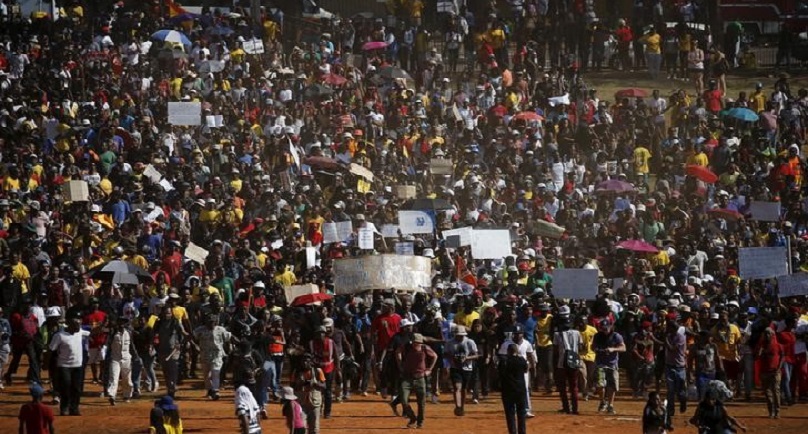Image: Protesters arrive during a protest over planned increases in tuition fees outside the Union building in Pretoria, October 23, 2015. REUTERS/Siphiwe Sibeko
By Peroshni Govender and Zandi Shabalala
PRETORIA (Reuters) – South Africa’s President Jacob Zuma on Friday ruled out university fee increases next year after a week of angry protests by students across the country in the first signs of the post-apartheid ‘Born Free’ generation flexing its muscle.
Police fired rubber bullets, tear gas and stun grenades at students who hurled rocks and lit fires on the grounds of Union Buildings, where the government has its offices in Pretoria, demanding Zuma come outside and address them.
But security officials feared for his safety, and Zuma remained inside, making the fee freeze announcement to the media instead.
“We decided against it because it was not safe,” a state security official told Reuters. “There were students there with stones.” A second source confirmed the change of plan.
The protest caps a week of angry demonstrations over the cost of university education – prohibitive for many blacks – amid frustration at the inequalities that persist two decades after the end of white-minority rule.
“On the matter at hand we agreed that there will be a zero increase of university fees in 2016,” Zuma said after meeting in private with student leaders and university management.
Some of the more than 12,000 students who gathered at Union Buildings in Pretoria welcomed Zuma’s announcement, but others said the measure fell short of their demand for free education.
“It’s a partial victory. It’s not a victory worthy of celebration. It just means that we are safe for this year,” Busisiwe Mashiqa, 29, a student at Fort Hare University said.
“There are many issues that need to be addressed and affordability is the main issue.”
Kenneth Matshili, 21, a student in Pretoria, said: “It’s better that we resolve the issues once for all. I am saying I want free education for all in our lifetime.”
Tuition fees vary across universities, but can run as high as 60,000 rand ($4,500) per year for medical students in a country where white households still earn six times more than black households, according to official figures.
But low growth since a 2009 recession has forced the government to keep a lid on spending, meaning that it has little spare cash to offer students in the form of enhanced subsidies.
The government, which subsidises universities, has said it cannot afford the free education that students are demanding.
PROTESTS PUNISH RAND
The rand currency touched a 3-1/2 week low against the dollar on Friday as investor sentiment soured due the protests, which analysts said had damaged Zuma.
“The protest has affected the image, stability and popularity of the ruling party. The damage is accumulating at Zuma’s doorstep before local elections next year,” BNP Paribas Securities South Africa political consultant Nic Borain said.
“Not raising fees for a year is not a sustainable solution, this will still remain a crisis for the government.”
Two decades after the end of apartheid, many students have no personal recollection of apartheid and thus little emotional allegiance to the ruling African National Congress (ANC).
On Wednesday, riot police threw stun grenades at students who stormed the parliament precinct in Cape Town as Finance Minister Nhlanhla Nene delivered his interim budget in which he painted a gloomy outlook for Africa’s most advanced economy.
“The ANC just talks, we support the ANC but we just don’t support the current cabinet…The children are making a plea, you should listen,” Makungu Sithole, 21, an engineering student said.
South Africa has a million students in further education, a figure that the ANC wants to increase to 1.5 million by 2030.
Universities say they need higher fees to keep up standards and they urged the government to find the extra money.
($1 = 13.3265 rand)
(Additional reporting by Johannesburg bureau; Writing by James Macharia; editing by Susan Thomas)
Copyright 2015 Thomson Reuters. Click for Restrictions.


